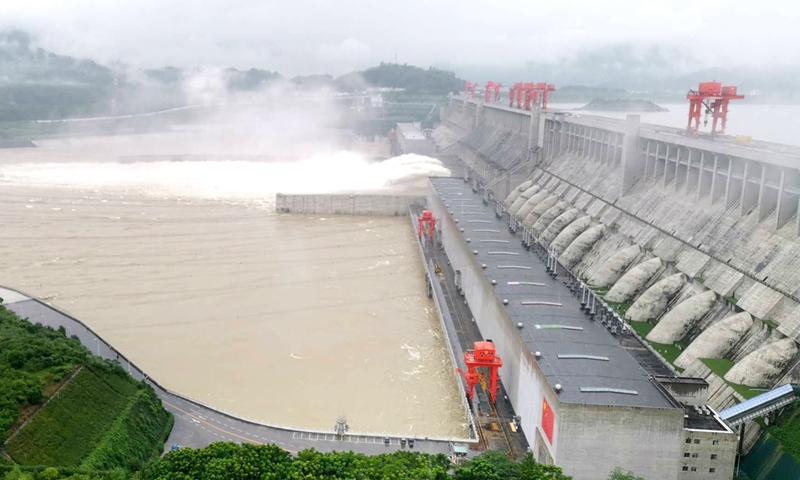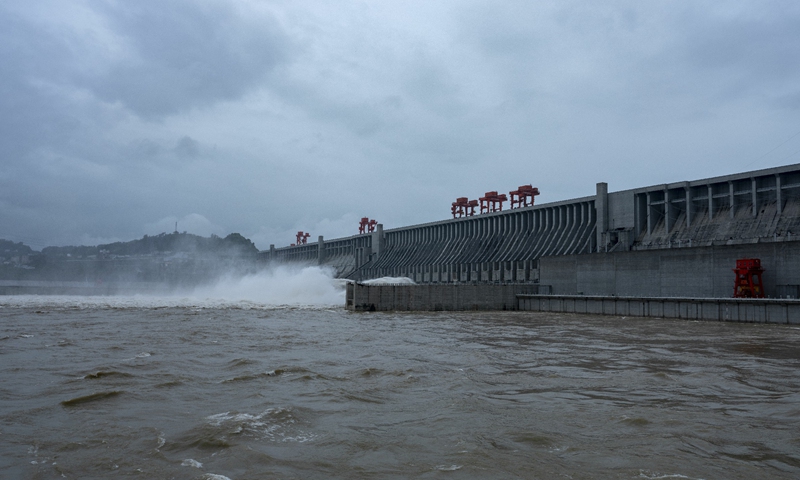Three Gorges Dam serves to prevent flood disasters with stable operation, company said, refuting distortion, collapse rumors
By Shan Jie and Zhao Juecheng Source: Global Times Published: 2020/7/18 20:14:16

The flood water passes the Three Gorges Dam on Friday.Photo: Courtesy of Zheng Bin
The Three Gorges Dam has been functioning to ease flood prevention pressure in the Yangtze River's middle and downstream areas, the company that operates the dam on Saturday told the Global Times, refuting frequent rumors and accusations from overseas media regarding the dam's condition, such as its distortion or inability to reduce flooding.
This year's floods have hit several provincial regions hard, causing more than 20 million people to be stricken by the disaster and more than 1.76 million to be relocated, according to the Ministry of Emergency Management.
By Friday, the Three Gorges project has applied three times, during this flood season, its flood prevention function and stopped 6.6 billion cubic meters of water, equaling to approximately the size of 470 West Lake's in Hangzhou, read a statement the Three Gorges Corporation Hub Management Center sent to the Global Times on Saturday.
During the floods, the Three Gorges Reservoir has applied its functions of flood retention and flood peak reduction, according to the statement, which stopped water levels from surpassing safety guarantees at Chenglingji, the exit of Dongting Lake, and Hukou, the exit of Poyang Lake.

The flood water passes the Three Gorges Dam on Friday.Photo: Courtesy of Huang Zhengping
The dam has largely eased flood prevention pressure in the middle and lower reaches of the Yangtze River, which, without the Three Gorges project, would face an intensive situation to contain flooding.
The Three Gorges project has come into the spotlight recently. The corporation responded to frequent questions and even rumors in the statement.
A Tuesday report from Reuters quoted a geographer as saying that "the Three Gorges Dam reservoir does not have the capacity to significantly affect the most severe floods."
However, the geographer's comments neglected the fact that the Three Gorges project's duty of flood prevention is mostly based in the Chenglingji region, which is located at the exit of Dongting Lake. With a reservoir capacity for floodwater at 22 billion cubic meters, it is designed to prevent huge floods in the upper stream of the Yangtze River with the Three Gorges Dam working significantly to prevent such a situation spiraling out of control.
If flooding occurred via heavy rainfall in the middle and lower reaches of the Yangtze River, the cities surrounding these reaches would have to mainly rely on their own flood drainage facilities. Under such circumstances, the Three Gorges Dam can still make a contribution by retaining and impounding water to ease the pressure on those cities.
Exaggerating the Three Gorges Dam's "distortion" has also been somewhat of a cliché for certain overseas media outlets. In response to this cliché, the statement from the Three Gorges Dam noted that currently, the Three Gorges Dam is running safely in a good condition. During the past few years, there has been no so-called distortion occurring, or any other noteworthy risks.
The Three Gorges Dam, located in Central China's Hubei Province, on Saturday morning successfully went through its largest wave of flooding of this year, maintaining stable operations, the Xinhua News Agency reported.
At 8 am on Saturday, the Three Gorges reservoir saw an inflow of 61,000 cubic meters per second and an outflow 33,000 cubic meters per second, stopping 45 percent of the flooding. The water level has reached 160.17 meters.
Meanwhile, the Three Gorges hub has been running at full output with a combined generating capacity of 22.5 million kilowatts, as the reservoir sees its water level rising after several rounds of flooding.
The Three Gorges project is a multifunctional water control system, consisting of a 2,309-meter-long and 185-meter-high dam, a five-tier ship lock, and 34 hydropower turbo-generators.
RELATED ARTICLES:
Posted in: SOCIETY